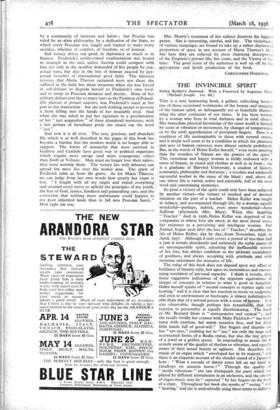HABSBURG AND HOHENZOLLERN
Maria Theresa. By Constance Lily Morris. (Eyre and Spottis- woode. 15s.) THIS excellent book has a peculiarly melancholy interest at the present time. The year of Maria Theresa's accession witnessed the first manifestation to the world- of a new spirit and a new method that 'had arisen in Prussia. When in that year Frederick the Great set out to snatch the dominions of the young Archduchess, he gloried in the fact that he did so in defiance of all law and honour and in breach of every under- taking. That was in 174o. Till her death in 178o, Maria • Theresa was engaged in ceaseless struggle against the alternate force and fraud of Prussia. She, in fact, bequeathed a greater empire than she had inherited : yet she well knew that it was all the while a losing battle. She, whose armies had occupied Berlin and had almost had to evacuate Vienna. would hardly be surprised that her descendant in the sixth generation aspires in vain to rule a country of six million souls. But she might be allowed same freedom of expression, were she to learn that the 'good people of her country, rather than , take back a Habsburg prince, had bartered the remnants of their culture, their pride, and their tradition in exchange for . a gasmask and a pair of cheap brown boots.
Maria Theresa could command great armies : she was served by brilliant statesmen. But neither she nor any Habsburg could maintain the struggle against the Hohenzollern, along the old and recognised lines. The Habsburgs respected international law, as their pathetic reliance upon the Pragmatic Sanction sufficiently testifies : but Prussia made treaties only to gain time, and boasted of having reduced diplomacy to a systematic trickery. The Habsburgs drew strength from the devotion of their people, to. whom they attached themselves
by a community of interests and habits : but Prussia was ruled by an alien philosophy, by a deification of the State, to which every Prussian was taught and trained to make every sacrifice, whether of comfort, of freedom, or of -honour.
Bad money drives out good, in diplomacy as much as in finance. Frederick's newly-coined totalitarianism was bound to triumph in the end, unless Austria could compete with him not only in the sacrifice demanded of her people by per- petual wars, but also in the loss of honour exacted by per- petual breaches of international good faith. The bitterest reverses that Maria Theresa sustained were not those she suffered in the field, but those occasions when she was forced in self-defence to degrade herself to Frederick's own level, and to stoop to Prussian menaces and deceits. None of her military defeats cost her so many tears as the Partition of Poland. Elle pleurait et prenait toujours, was Frederick's sneer at her part in this transaction : but she took nothing except to prevent it from falling into the hands of her insatiable rival. And when she was asked to put her signature to a proclamation of her " just acquisition " of these plundered territories, with a last gesture of hereditary pride she struck out the word " just."
And now it is all over. The easy, gracious, and abundant life which is so well described in the pages of this book has , become a burden that the modern world is no longer able to support. The forms of monarchy that were satirised in Gulliver and Candide have given way to political, organisms which require more savage (and more courageous) critics than Swift or Voltaire. Men must no longer love their rulers, they must worship them. The victory lies with whoever can spread the most lies over the widest area. The spirit of Frederick rules us from the grave. As for Maria Theresa, we can judge from her own words how utterly her cause is lost. " I fought with all my might and risked everything and strained every nerve to uphold the principles of my youth, the fear of God, justice, kindness and painstaking care, and the conviction that nothing more unfortunate could bappen to my poor inherited lands than to fall into Prussian hands." How right she was. Mrs. Morris's treatment of her subject deserves the highest praise. She is interesting, careful, and fair. The vicissitudes of various campaigns are bound to take up a rather depressing proportion of space in any account of Maria Theresa's life : but here they are relieved by most charming descriptions of the Empress's private life, her court, and the Vienna of her time. The good sense of the authoress is well set off by the appropriate and lavish production of the book.
CHRISTOPHER HOBHOUSE.















































 Previous page
Previous page